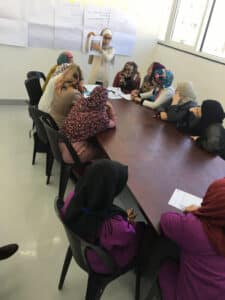16 April 2018.
Amman – To help a thriving garment industry reach greater heights, Better Work Jordan, a joint programme of the International Labour Organization and the International Finance Corporation, launched a Productivity Project tailored to the specific needs of small and medium enterprises (SMEs). The initiative helps businesses foster productivity, while also ensuring good working conditions.

Jordan’s garment industry plays a vital role in the country’s economic growth and development. As a rapidly-expanding industry, garment and related exports accounted for about 25 per cent of Jordan’s total exports, which exceeded USD1.6 billion in 2017. It is also believed that the industry has the potential to grow further, by as much as 50 per cent, creating much-needed new jobs in the process.
Better Work Jordan’s SMEs Productivity Project has designed specific, productivity-enhancing toolkits to train both workers and managers in the garment industry. “The Productivity Project has already garnered some impressive results,” explained Ala’a Al-Saifi, Better Work Jordan Team Leader. “By creating tailored training programmes for both managers and workers, we have been able to address each factory’s particular needs and more effectively support their integration into the industry.”
Programmes for workers primarily address two skillsets; namely soft skills and technical skills. The former focuses on improving worker culture and efficiency via training on the overall structure of the garment industry and roles, rights, and responsibilities in the workplace. Topics covered include Supervisory Skills Training, the Supply Chain, Financial Literacy, Workplace Communication, and Basic Rights and Responsibilities. Participant feedback has indicated that the three-day Supervisory Skills Training is especially beneficial as the programme provides practical tools to help improve leadership and professionalism in the workplace.
Workers in the garment industry are predominantly female, and such trainings further support female empowerment and Better Work’s Global Gender Equality agenda.
Kifah*, a tailor in one of Jordan’s garment factories in Ajloun, a hilly town in the north of Jordan, shared her experience. “I am grateful for the opportunity to participate in the Financial Literacy training programme. My dream is to one day build a bigger house and furnish it. I want it to have big closets! By learning how to list my monthly expenses and cut a few costs, I now know that I can save money on a monthly basis and make my dream come true!”
Through the Productivity Project’s targeted Supply Chain training, workers are also introduced to the basic concept of a supply chain including the components and parties involved. The programme instills a sense of pride and ownership in employees, as, by understanding the cycle of production and the responsibilities of different factory departments, workers are more aware of the importance of the role they themselves play in production. Muna Ali, Ministry of Labour Inspector on secondment to Better Work Jordan commented on the unique attributes of the Productivity Project: “I have witnessed a genuine shift in energy while delivering the soft skills training. The tools provided help workers achieve their career goals and the programme makes them feel empowered both at work and in their personal life.”
The Productivity Project also delivers technical training, highlighting aspects of manufacturing that boost productivity at the factory level. Trainings cover themes including plant layout and logistics, machinery and equipment, and resource efficiency, among others. Recently, Better Work has added new components to the training such as Lean Manufacturing and the so-called ‘Five S’ Methodology – a workplace organization method that uses five Japanese words (seiri, seiton, seiso, seiketsu, and shitsuke) as principals for organizing a workspace efficiently and effectively by carefully identifying and storing all the items used. Technical training is also geared towards supervisors and new operators, introducing participants to Works Methods, Manufacturing Systems, Process Tools, and the Supervisor’s Role, for example.
What makes the Productivity Project unique is the flexibility of its approach, allowing training to be adapted to the needs and strengths of each participating factory. Not all factories receive the same training package and sessions are provided on a factory-by-factory basis. All toolkits generated on advisory services, soft skills training, and the more substantive aspects of productivity were designed based on the results of a Training Needs Analysis conducted in conjunction with the International Finance Corporation, a member of the World Bank Group. International Finance Corporation Operations Officer, Soledad Requejo explained,“ The Productivity Project’s soft skills and technical skills trainings have been created after carefully assessing the needs of factories and workers, which is why we believe that these trainings can greatly improve productivity, employee morale, and factory culture.”
For more information please read this World Bank Blog by Michelle Davis.
*Name has been changed